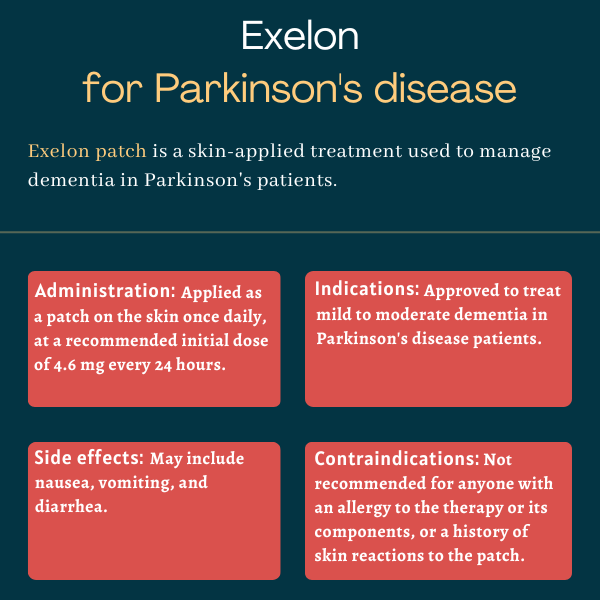Exelon patch (rivastigmine transdermal system) for Parkinson’s disease
Last updated March 8, 2023, by Marisa Wexler, MS

What is Exelon patch for Parkinson’s disease?
Exelon patch (rivastigmine transdermal system) is an approved treatment that is used to help manage mild-to-moderate dementia in people with Parkinson’s disease.
The name-brand therapy was initially approved as oral capsules or oral solutions, but now only exists in the U.S. as a transdermal, or skin-applied, patch formulation. The therapy is currently sold by Sandoz, a spinoff company of Novartis.
Generic versions of the transdermal patch and the capsule formulation also are available in the U.S.
Exelon patch and these generic formulations of rivastigmine also are approved for the treatment of dementia in individuals with Alzheimer’s disease.
Therapy snapshot
| Brand name: | Exelon patch |
| Chemical name: | Rivastigmine transdermal system |
| Usage: | Used to manage mild to moderate dementia in Parkinson’s patients |
| Administration: | Skin patch |
How does Exelon patch work?
Nerve cells within the body communicate with one another using signaling molecules called neurotransmitters. Parkinson’s disease is caused by the death and dysfunction of cells in the brain that are responsible for making the neurotransmitter dopamine.
Although the exact mechanism of how the Exelon patch works in Parkinson’s dementia is not known, it’s thought that the therapy mainly acts to increase the signaling power of another neurotransmitter called acetylcholine. Specifically, the medication’s active ingredient rivastigmine can prevent the breakdown of acetylcholine, thereby increasing levels of this neurotransmitter.
People with dementia typically have lower than normal acetylcholine activity, so boosting the strength of these signals may help to ease dementia symptoms. There is no evidence that rivastigmine alters the underlying disease processes that cause dementia.
Who can take Exelon patch?
Exelon patch was approved by the U.S. Food and Drug Administration in July 2007 as a treatment for mild to moderate dementia associated with Parkinson’s disease.
In Europe, the capsule formulation of rivastigmine was approved for the same indication in May 1998 and remains available under the brand name Exelon. Novartis also tried to extend Exelon’s approval in the European Union to include a transdermal patch, but decided to withdraw its application in 2012 after an advisory committee raised some questions about its use and said that more data would be needed.
Who should not take Exelon patch?
Exelon patch is contraindicated, or not recommended, for certain people with Parkinson’s:
- Anyone with a known allergy to rivastigmine, other carbamate derivatives, or any of the components in the medication should not use it.
- Patients with a history of skin reactions to the patch suggestive of allergic contact dermatitis, a type of allergic reaction, are recommended to not use it. These patients also should not use other formulations of rivastigmine unless they test negative for an allergy to the medication.
Exelon patch also should not be used in combination with certain medications including:
- metoclopramide, an anti-sickness medication
- beta-blockers, which are medicines used to lower blood pressure
- other therapies that modulate acetylcholine signaling, such as cholinomimetics and anticholinergic medications.
How is Exelon patch administered in Parkinson’s?
Exelon patch is available as a four-layer laminate containing a beige backing layer, a drug matrix, an adhesive matrix, and an overlapping release liner. The patches are applied to intact skin, and should be replaced every 24 hours with a new patch.
Three dosing strengths are available, each with a different size, and delivering a specific concentration of the active medication over the 24-hour period. These are the:
- Exelon patch 4.6 mg/24 hours, available in 5 square centimeter patches containing 9 mg rivastigmine
- Exelon patch 9.5 mg/24 hours, available in 10 square centimeter patches containing 18 mg rivastigmine
- Exelon patch 13.3 mg/24 hours, available in 15 square centimeter patches containing 27 mg rivastigmine.
The initial dosage is 4.6 mg per 24 hours. After at least four weeks, this dosage may be increased to 9.5 mg per 24 hours, which is considered the minimum dose needed to achieve a clinical effect. If needed, the dosage may be further increased to 13.3 mg per 24 hours.
It has been noted that higher doses do not provide any additional benefit and may increase the frequency of side effects.
In the event of a missed dose, a new patch can be applied immediately and patients can proceed to apply the next patch at the usual time on the following day. However, if treatment is interrupted longer than three days, patients should restart treatment at 4.6 mg per 24 hours and repeat the dose-escalation process.
In patients with mild to moderate liver impairment or those who weigh less than 50 kg (about 110 pounds), dose adjustments may be needed, and the 4.6 mg per 24 hours dose should be considered as the initial and maintenance dose.
Patients should rotate the application site of the patch to minimize skin irritation, ensuring that the same site is not reused within a 14-day period. The patch should be replaced daily, and consistency in the time of day for replacement is recommended.
Patients also are advised to avoid prolonged exposure of the Exelon patch to excessive sunlight, saunas, or solariums.
It’s recommended patients wash their hands after handling the patch and avoid eye contact. If accidental contact with the eyes occurs or if the eyes become red after handling the patch, it is advised to rinse them with plenty of water. If symptoms persist, seeking medical advice is recommended.
Generic versions of rivastigmine also are available in capsule formulations that may be taken by mouth and can be interchanged at equal doses. Capsules are available at dosages of 1.5, 3, 4.5, or 6 mg.
Oral formulations of rivastigmine should be taken with meals in divided doses in the morning and evening. The starting dose is 1.5 mg twice daily. After a minimum of four weeks, or about one month, this can be increased to 3 mg twice daily, then to 4.5, and then 6 mg, if needed and tolerated.
Patients currently using the capsule formulation of rivastigmine may switch to the Exelon patch based on their current dosage. If their total daily dose is less than 6 mg of oral rivastigmine, they can transition to the 4.6 mg/24 hours Exelon patch. For those on a total daily dose of 6 mg to 12 mg of oral rivastigmine, the recommended switch is to the 9.5 mg/24 hours Exelon patch.

Exelon in clinical trials
Approval of the Exelon patch as a treatment for mild to moderate dementia in Parkinson’s disease was supported by data from a placebo-controlled trial that tested the oral formulation of rivastigmine, Exelon.
Trial of Exelon
The study included 541 people with Parkinson’s who developed mild to moderate dementia at least two years after their diagnosis. These patients ranged in age from 50-91, about two-thirds were men, and virtually all were white individuals.
The participants were randomly assigned to receive rivastigmine at total doses of 3-12 mg per day, or a placebo. The study included a 16-week (about four-month) titration phase in which doses were adjusted, followed by eight weeks (about two months) of maintenance treatment at a steady dose. In total, the study lasted 24 weeks, or about six months.
The trial’s main goals were to assess the impact of treatment on cognition. This was measured by a standardized cognitive assessment called the Alzheimer’s Disease Assessment Scale (ADAS-cog), and also by changes in the Alzheimer’s Disease Cooperative Study-Clinician’s Global Impression of Change (ADCS-CGIC) — a method that clinicians use to assess and rate the overall change in a patient’s condition.
By the end of the 24 weeks, average ADAS-cog scores had improved by an average of 2.1 points, whereas ADAS-cog scores worsened slightly (by 0.7 points) for patients given a placebo, the results showed.
Clinically meaningful improvements in ADCS-CGIC scores were seen in 19.8% of patients taking rivastigmine and 14.5% in the placebo group. Conversely, 13% of the rivastigmine group and 23.1% of those on the placebo showed clinically meaningful worsening in their condition.
Significantly better outcomes also were seen with rivastigmine relative to the placebo regarding activities of daily living, behavioral and psychological symptoms, and other measures of cognitive function.
Trial of Exelon patch
A later study assessed the efficacy and tolerability of Exelon patch, versus a placebo, in 28 Parkinson’s patients with mild cognitive impairment. After about five months, Exelon patch demonstrated a potential positive effect by showing trends for improvements in ADCS-CGIC scores, overall cognitive rating, disease-related health status, and anxiety severity. Additionally, there was a significant improvement in performance-based measures of cognitive abilities.
Other clinical trials also have shown that both the Exelon patch and other formulations of rivastigmine can lessen signs of dementia in people with Alzheimer’s.
Common side effects of Exelon
The most common side effects with use of Exelon patch include:
- nausea
- vomiting
- diarrhea.
Overdoses
Exelon patches should be applied once every 24 hours, and the old patch should be removed before a new one is applied to the skin. There have been reports of hospitalization and even death when more than one patch is applied at the same time.
Digestive issues
The Exelon patch and other formulations of rivastigmine can cause digestive side effects, including nausea, diarrhea, vomiting, and reduced appetite, which may lead to weight loss and dehydration for patients. These side effects may necessitate an interruption of treatment.
Application site and allergic reactions
Exelon patch may cause application-site reactions in the skin. If such reactions are severe or spread beyond the site of application, or if they don’t ease substantially within two days after removing the patch, treatment with Exelon patch should be discontinued.
Neurologic and cardiac effects
Worsening of parkinsonian symptoms, in particular tremor, has been observed in patients with dementia associated with Parkinson’s who were treated with Exelon capsules. Medicines that increase cholinergic activity also have the potential for causing seizures.
The use of Exelon patch may cause an abnormally slow heart rate (bradycardia), especially in patients with preexisting cardiac conditions.
Stomach ulcers
Due to increased acethylcoline activity, Exelon patch may increase stomach acid secretion. As such, patients should be monitored for symptoms of gastrointestinal bleeding, especially those at increased risk for developing ulcers.
Urinary and pulmonary effects
Medicines that increase cholinergic activity, such as Exelon patch, may cause urinary obstruction. These medicines should also be used with care in patients with a history of asthma or obstructive pulmonary disease.
Effects on ability to drive and use machines
Patients using Exelon patch should be routinely evaluated for their ability to drive or operate machinery, as dementia and potential side effects of the therapy may compromise these functions.
Use in pregnancy and breastfeeding
Exelon patch and other formulations of rivastigmine have not been rigorously studied in people who were pregnant or breastfeeding. In animal studies, rivastigmine did not cause problems for a developing fetus when used at doses up to four times higher than the approved dose in people. Animal studies also have suggested that the medication is excreted in breast milk, but the meaning of this to the nursing infant is not known.
In these situations, the potential benefits of treatment should be weighed carefully against the possibility for risk.
Parkinson’s News Today is strictly a news and information website about the disease. It does not provide medical advice, diagnosis or treatment. This content is not intended to be a substitute for professional medical advice, diagnosis, or treatment. Always seek the advice of your physician or another qualified health provider with any questions you may have regarding a medical condition. Never disregard professional medical advice or delay in seeking it because of something you have read on this website.
Recent Posts
- Method generates dopaminergic neurons lost in Parkinson’s disease
- Parkinson’s disease self-care tips include tracking, support: Study
- Researchers float ‘brain-first, body-first’ model as Parkinson’s origin
- Parkinson’s may change the way emotions manifest in body: Study
- My husband’s Parkinson’s diagnosis prompts ever-evolving feelings






